目录
- 嵌入式Servlet容器
- 1、原理分析
- 2、Servlet容器切换
- 3、定制Servlet容器配置
- 定制化组件
嵌入式Servlet容器
在Spring Boot中,默认支持的web容器有 Tomcat, Jetty, 和 Undertow
1、原理分析
那么这些web容器是怎么注入的呢?我们一起来分析一下
当SpringBoot应用启动发现当前是Web应用,它会创建一个web版的ioc容器ServletWebServerApplicationContext
这个类下面有一个createWebServer()方法,当执行关键代码ServletWebServerFactory factory = this.getWebServerFactory();时,它会在系统启动的时候寻找 ServletWebServerFactory(Servlet 的web服务器工厂—> 用于生产Servlet 的web服务器)
private void createWebServer() {
WebServer webServer = this.webServer;
ServletContext servletContext = this.getServletContext();
if (webServer == null && servletContext == null) {
StartupStep createWebServer = this.getApplicationStartup().start("spring.boot.webserver.create");
// 获取ServletWebFactory
ServletWebServerFactory factory = this.getWebServerFactory();
createWebServer.tag("factory", factory.getClass().toString());
// 这里会去调用系统中获取到的web容器工厂类的getWebServer()方法
this.webServer = factory.getWebServer(new ServletContextInitializer[]{this.getSelfInitializer()});
createWebServer.end();
this.getBeanFactory().registerSingleton("webServerGracefulShutdown", new WebServerGracefulShutdownLifecycle(this.webServer));
this.getBeanFactory().registerSingleton("webServerStartStop", new WebServerStartStopLifecycle(this, this.webServer));
} else if (servletContext != null) {
try {
this.getSelfInitializer().onStartup(servletContext);
} catch (ServletException var5) {
throw new ApplicationContextException("Cannot initialize servlet context", var5);
}
}
this.initPropertySources();
}
获取ServletWebFactory
protected ServletWebServerFactory getWebServerFactory() {
String[] beanNames = this.getBeanFactory().getBeanNamesForType(ServletWebServerFactory.class);
if (beanNames.length == 0) {
throw new MissingWebServerFactoryBeanException(this.getClass(), ServletWebServerFactory.class, WebApplicationType.SERVLET);
} else if (beanNames.length > 1) {
throw new ApplicationContextException("Unable to start ServletWebServerApplicationContext due to multiple ServletWebServerFactory beans : " + StringUtils.arrayToCommaDelimitedString(beanNames));
} else {
return (ServletWebServerFactory)this.getBeanFactory().getBean(beanNames[0], ServletWebServerFactory.class);
}
}
SpringBoot底层默认有很多的WebServer工厂:TomcatServletWebServerFactory,,JettyServletWebServerFactory和 UndertowServletWebServerFactory

那么究竟返回哪一个工厂呢?
我们需要分析一下底层的自动配置类,ServletWebServerFactoryAutoConfiguration
@AutoConfiguration
@AutoConfigureOrder(-2147483648)
@ConditionalOnClass({ServletRequest.class})
@ConditionalOnWebApplication(
type = Type.SERVLET
)
@EnableConfigurationProperties({ServerProperties.class})
@Import({ServletWebServerFactoryAutoConfiguration.BeanPostProcessorsRegistrar.class, EmbeddedTomcat.class, EmbeddedJetty.class, EmbeddedUndertow.class})
public class ServletWebServerFactoryAutoConfiguration {
public ServletWebServerFactoryAutoConfiguration() {
}
...
它引入了一个配置类ServletWebServerFactoryConfiguration,这个类里面会根据动态判断系统中到底导入了那个Web服务器的包,然后去创建对应的web容器工厂,spring-boot-starter-web这个依赖默认导入tomcat,所以我们系统会创建TomcatServletWebServerFactory,由这个工厂创建tomcat容器并启动
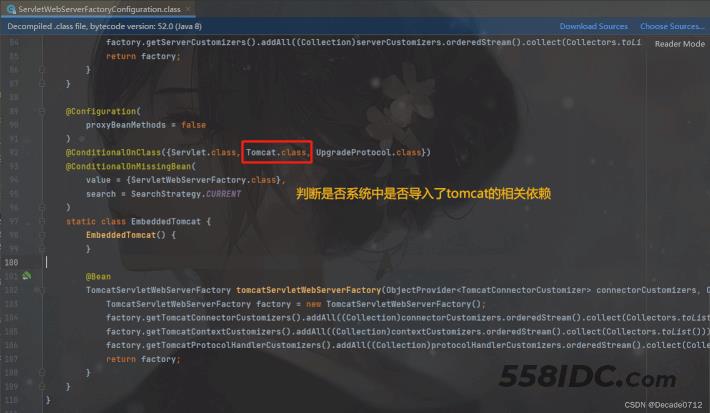
一旦我们获取到web Server的工厂类,createWebServer()方法就会去调用this.webServer = factory.getWebServer(new ServletContextInitializer[]{this.getSelfInitializer()});
根据断点一直深入,我们可以发现,Tomcat, Jetty, 和 Undertow的工厂类最后都会去调用getWebServer()方法,设置了链接参数,例如TomcatServletWebServerFactory的getWebServer()方法
在方法的最后,它会执行return this.getTomcatWebServer(tomcat);,跟着断点深入,我们发现它会去调用对应web容器类的构造方法,如TomcatWebServer的构造方法,启动tomcat容器
public TomcatWebServer(Tomcat tomcat, boolean autoStart, Shutdown shutdown) {
this.monitor = new Object();
this.serviceConnectors = new HashMap();
Assert.notNull(tomcat, "Tomcat Server must not be null");
this.tomcat = tomcat;
this.autoStart = autoStart;
this.gracefulShutdown = shutdown == Shutdown.GRACEFUL ? new GracefulShutdown(tomcat) : null;
// 初始化方法initialize---会调用this.tomcat.start();启动容器
this.initialize();
}
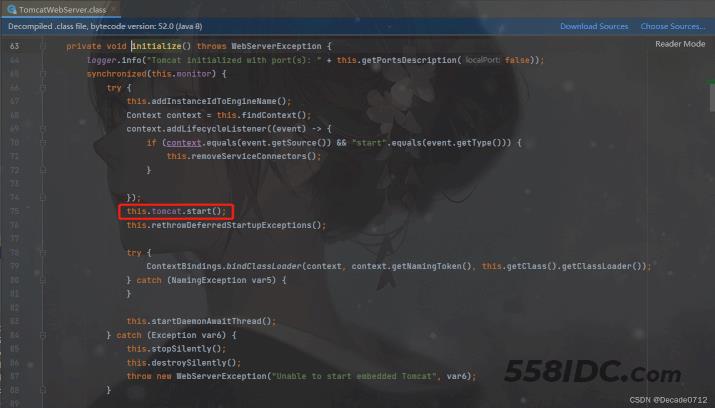
2、Servlet容器切换
Spring Boot默认使用的是tomcat容器,那如果我们想要使用Undertow应该如何切换呢
只需要修改pom文件即可,排除web启动器中tomcat相关的依赖
然后导入Undertow相关启动器
<dependency>
<groupId>org.springframework.boot</groupId>
<artifactId>spring-boot-starter-web</artifactId>
<exclusions>
<exclusion>
<groupId>org.springframework.boot</groupId>
<artifactId>spring-boot-starter-tomcat</artifactId>
</exclusion>
</exclusions>
</dependency>
<dependency>
<groupId>org.springframework.boot</groupId>
<artifactId>spring-boot-starter-undertow</artifactId>
</dependency>
3、定制Servlet容器配置
如果想要自己定义一个Servlet容器,可以通过哪些途径呢?
- 通过分析
ServletWebServerFactoryAutoConfiguration绑定了ServerProperties配置类可知,我们想要修改容器的配置,只需要修改配置文件中对应的server.xxx配置项即可 - 创建一个配置类,通过@Configuration+@Bean的方式,向容器中注入一个
ConfigurableServletWebServerFactory类的实现类,ConfigurableServletWebServerFactory是ServletWebServerFactory类的子类,提供了很多方法供我们使用
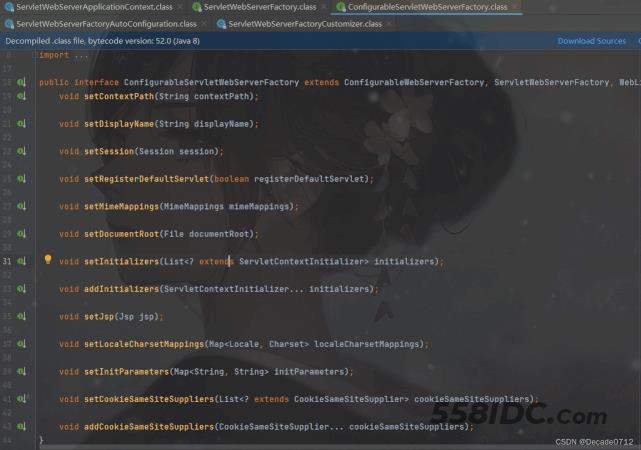
代码样例如下
package com.decade.config;
import org.springframework.boot.web.embedded.tomcat.TomcatServletWebServerFactory;
import org.springframework.boot.web.servlet.server.ConfigurableServletWebServerFactory;
import org.springframework.context.annotation.Bean;
import org.springframework.context.annotation.Configuration;
@Configuration
public class MyConfig {
@Bean
public ConfigurableServletWebServerFactory defineWebServletFactory() {
final TomcatServletWebServerFactory tomcatServletWebServerFactory = new TomcatServletWebServerFactory();
tomcatServletWebServerFactory.setPort(8081);
return tomcatServletWebServerFactory;
}
}
自定义一个ServletWebServerFactoryCustomizer类,它的下面有一个customize()方法,能把配置文件的值和ServletWebServerFactory 进行绑定

Spring官网提供的样例如下

Spring中有很多xxxxxCustomizer,它的作用是定制化器,可以改变xxxx的默认规则
定制化组件
结合之前的原理分析过程可知,我们分析一个组件的过程可以概括为:
导入对应启动器xxx-starter---->分析xxxAutoConfiguration---->导入xxx组件---->绑定xxxProperties配置类----->绑定配置项
那么如果我们要定制化组件,例如自定义参数解析器或者应用启动端口等,可以怎么做呢?
- 修改配置文件 server.xxx
- 参考上面编写一个xxxxxCustomizer类
- 编写自定义的配置类xxxConfiguration:使用@Configuration + @Bean替换、增加容器中默认组件
- 如果是Web应用,编写一个配置类实现
WebMvcConfigurer接口,重写对应方法即可定制化web功能,或者使用@Bean给容器中再扩展一些组件(这条是最重要的)
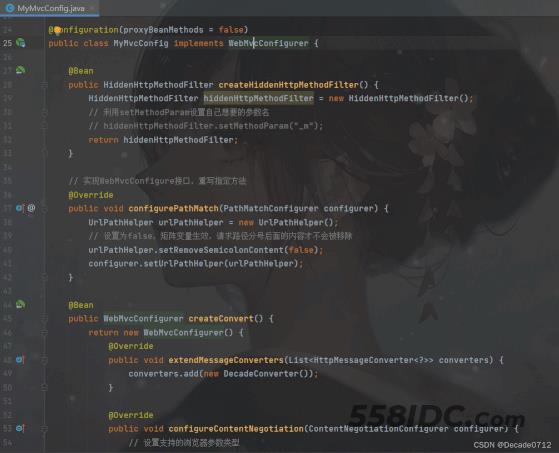
注意:@EnableWebMvc + 实现WebMvcConfigurer接口:配置类中定义的@Bean可以全面接管SpringMVC,所有规则全部自己重新配置
原理:
WebMvcAutoConfiguration类是SpringMVC的自动配置功能类。配置了静态资源、欢迎页…- 一旦使用
@EnableWebMvc会,@Import(DelegatingWebMvcConfiguration.class)
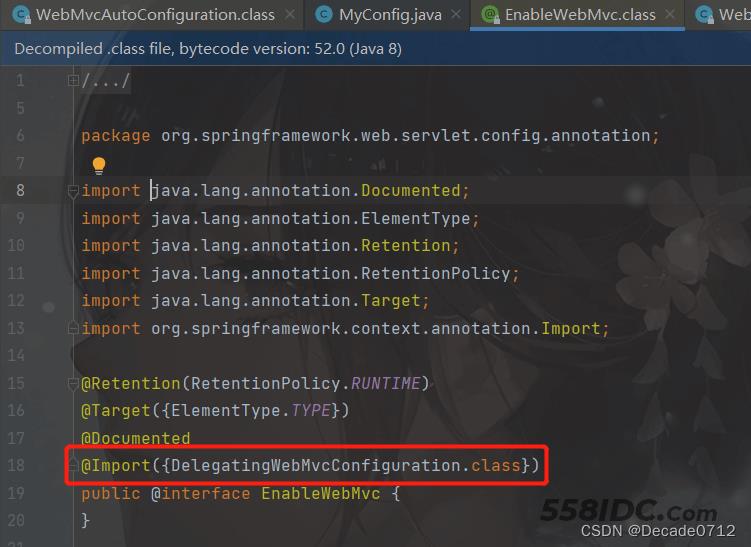
DelegatingWebMvcConfiguration类的作用是:只保证SpringMVC最基本的使用
public class DelegatingWebMvcConfiguration extends WebMvcConfigurationSupport表明它是WebMvcConfigurationSupport的子类- 它会把所有系统中的 WebMvcConfigurer的实现类拿过来,所有功能的定制都是这些WebMvcConfigurer的实现类合起来一起生效

WebMvcConfigurationSupport自动配置了一些非常底层的组件,例如RequestMappingHandlerMapping,这些组件依赖的其他组件都是从容器中获取的,例如ContentNegotiationManager等
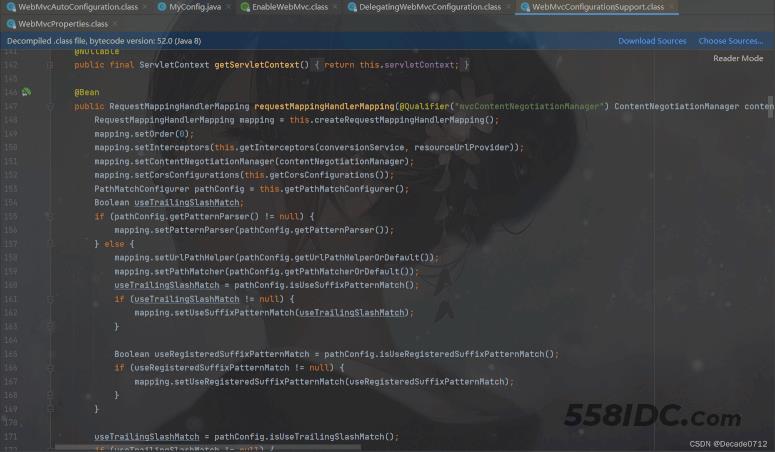
由代码可知,WebMvcAutoConfiguration里面的配置要能生效必须系统中不存在WebMvcConfigurationSupport类,所以,一旦配置类上加了@EnableWebMvc,就会导致WebMvcAutoConfiguration没有生效

到此这篇关于SpringBoot嵌入式Servlet容器与定制化组件超详细讲解的文章就介绍到这了,更多相关SpringBoot Servlet容器内容请搜索自由互联以前的文章或继续浏览下面的相关文章希望大家以后多多支持自由互联!
